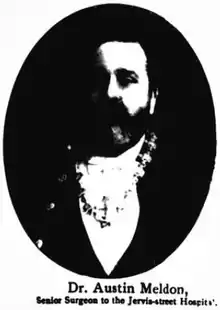Austin Meldon | |
|---|---|
 | |
| Born | 26 August 1844 |
| Died | 28 April 1904 (aged 59) |
| Occupation(s) | Surgeon, writer |
Austin George Meldon (26 August 1844 – 28 April 1904) F.R.C.S., D.L. was an Irish surgeon and writer.
Career
Meldon became a Licentiate of the Royal College of Surgeons, Ireland in 1864.[1] He became a Licentiate of the King and Queen's College of Physicians in 1865. Meldon authored medical papers on cholera, diseases of the skin and gout.[1] He was a member of the British Medical Association and attended the annual meeting in Dublin in 1887. Meldon married twice. He had two sons and one daughter.[1] His sons were George Edward Pugin Meldon and James Austin Meldon.[2]
Meldon rejected the uric acid theory as a full explanatory for gout. He promoted his own "neuro-humoral theory" which held that gout and rheumatism were caused by a depressed condition of the nervous system.[3][4][5]
Meldon was buried at Glasnevin Cemetery.[1]
Selected publications
- A Treatise on Diseases of the Skin and its Appendages (1872)
- Intravenous Injection of Milk (The British Medical Journal, 1881)
- Pathology And Treatment Of Gout (The British Medical Journal, 1881)
- A Treatise on Gout and Rheumatic Gout (1886)
Awards and recognition
Meldon was a double gold medallist in surgery and midwifery and first prizeman in anatomy at the Catholic University Medical School.[1] He was appointed surgeon to Jervis Street Hospital, a position he held until his retirement.[1]
References
- 1 2 3 4 5 6 "Austin Meldon, F.R.C.S., D.L". The British Medical Journal. 1 (2262): 1110–1111. 1904. doi:10.1136/bmj.1.2262.1110-d. PMC 2354051.
- ↑ "Austin George Meldon". Edward Liddle's International Profiles. Retrieved 28 December 2020.
- ↑ "A Treatise on Gout, Rheumatism, and Rheumatic Gout". The British and Foreign Medical Review. 51 (102): 441–444. 1873. PMC 5150148.
- ↑ "A Treatise on Gout, Rheumatism and Rheumatic Gout". The Dublin Journal of Medical Science. 57: 264–265. 1874.
- ↑ Duckworth, Dyce (1881). "On Gout Considered as a Tropho-Neurosis". The British Medical Journal. 1 (1056): 463–466. doi:10.1136/bmj.1.1056.463. PMC 2263540. PMID 20749827.